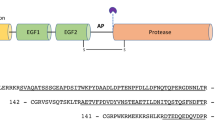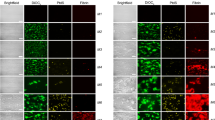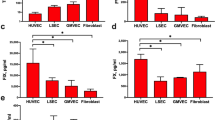Abstract
WHEN plasma containing platelets clots at 37° C., the adenosine triphosphate in the platelets rapidly breaks down; little or none of it appears in the serum1. It has now been found that during clotting an increased amount of phosphate becomes bound to protein. The phosphate seems to come partly from platelet adenosine triphosphate and partly from phospholipid. One of the experiments which demonstrated this was as follows.
This is a preview of subscription content, access via your institution
Access options
Subscribe to this journal
Receive 51 print issues and online access
$199.00 per year
only $3.90 per issue
Buy this article
- Purchase on Springer Link
- Instant access to full article PDF
Prices may be subject to local taxes which are calculated during checkout
Similar content being viewed by others
References
Born, G. V. R., J. Physiol., 133 61, P (1956).
Berenblum, J., and Chain, E., Biochem. J., 32, 295 (1938).
Folch, J., Lees, M., and Sloane-Stanley, G. H., Fed. Proc., 13, 209 (1954).
Fantl, P., and Ward, H. A., Biochem. J., 64, 747 (1956).
Hardisty, R. M., and Pinniger, J. L., Brit. J. Haematol., 2, 139 (1956).
Author information
Authors and Affiliations
Rights and permissions
About this article
Cite this article
BORN, G. Evidence for the Formation of a Labile Phospholipoprotein during the Clotting of Platelet-rich Plasma. Nature 180, 546–547 (1957). https://doi.org/10.1038/180546a0
Issue Date:
DOI: https://doi.org/10.1038/180546a0
Comments
By submitting a comment you agree to abide by our Terms and Community Guidelines. If you find something abusive or that does not comply with our terms or guidelines please flag it as inappropriate.



